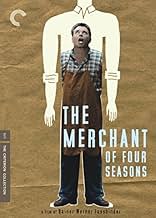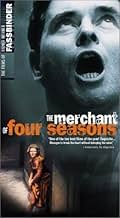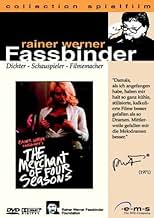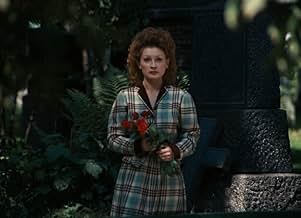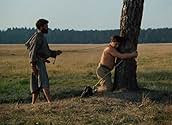O Comerciante das Quatro Estações
Título original: Händler der vier Jahreszeiten
AVALIAÇÃO DA IMDb
7,3/10
5,5 mil
SUA AVALIAÇÃO
Hans Epp é um homem autodestrutivo que vive uma vida de insatisfação. Ele tenta encontrar significado como vendedor de frutas, mas um ataque cardíaco impede sua capacidade de trabalhar, o qu... Ler tudoHans Epp é um homem autodestrutivo que vive uma vida de insatisfação. Ele tenta encontrar significado como vendedor de frutas, mas um ataque cardíaco impede sua capacidade de trabalhar, o que transforma sua insatisfação em desespero.Hans Epp é um homem autodestrutivo que vive uma vida de insatisfação. Ele tenta encontrar significado como vendedor de frutas, mas um ataque cardíaco impede sua capacidade de trabalhar, o que transforma sua insatisfação em desespero.
- Direção
- Roteirista
- Artistas
- Prêmios
- 3 vitórias e 5 indicações no total
Walter Sedlmayr
- Fruit cart salesman
- (as Walther Sedlmayer)
El Hedi ben Salem
- The Arab
- (as Salem El Heïdi)
Avaliações em destaque
The Merchant of Four Seasons received all major W German film awards for 1971 but it took a couple of more years for Fassbinder to break through internationally. TM4S is a fairly simple story but it can be difficult or painful to watch due to the subject matter: class prejudices, domestic violence, infidelity, family discord, depression and self-destructive behavior. In other words it presents a bleak view of the world and its human inhabitants. I believe there's an undercurrent of cutting humor throughout although it's interesting that no examples spring to mind and it's not campy. I saw TM4S in the mid-70s and in 2015 didn't remember much at all (other than not liking it), which suggests I repressed a lot that first time. I now think it's the first of a few masterpieces by a director whose importance will certainly endure.
THE MERCHANT OF FOUR SEASONS was Rainer Werner Fassbinder's first shot at mainstream acceptance. In a turbulent career of just fifteen years, he managed to create an astounding body of work in film and theater, both as a performer and a creative producer, actor, and director. Although this movie might not appeal to many viewers, the film has much to offer. The storyline is fairly straightforward. A man is ostracized from his upper middle class family due to emotional and economic problems, and proves unable to control his downward spiral. THE MERCHANT OF FOUR SEASONS is shot with a slavish devotion to elegant detail, and each set is very carefully designed and constructed. Every object on set seems painstakingly arranged so as to provoke layers of emotional texture. Many religious paintings and icons decorate the walls of the various rooms and seem to speak to Hans's desperate quest for spiritual meaning or direction in his life. Much thought was given to how lighting and color were employed to contrast and enhance the drama. Several times during the film, I froze the frame to marvel at the beauty of the shot's composition. I streamed this film, and the print was nearly flawless and second to none. Fassbinder employs his actors in an almost vehement "Anti-Natural' style. He does everything possible to prevent the actors from reacting in a normal or colloquial manner, and this creates a rather stilted effect. However, by doing so, he injects an almost 'hyper-reality' to the narrative. Rather than the presentation of a mundane melodrama, the actors almost militant lack of affectation forces the viewer to confront the film in a different manner. Fassbinder's film intentionally prevents the viewer from easily connecting with the characters' trials and tribulations. You are constantly on the outside, looking in. This will be a disconcerting experience for many, but I found it to be a unique and satisfying artistic adventure.
The Merchant of Four Seasons isn't what I would call a happy movie, at all, or even one that impressed me to the point of praising it to the sky (there are other Fassbinder flicks for that, like Veronika Voss and the underrated Satan's Brew). But it's certainly no less than a fascinating experiment in taking a look at those in a society that you and me and others we know might possibly know, or not really want to know. I imagine in the early 70s in Germany a generation, coming out of WW2, had a stigma to live with but tried their best just to get by. This is a stigma that floats all over this film, and in many instances in Fassbinder's work in general, but especially because with Four Seasons he takes his eye on the middle class, and a particular married couple- the distanced, depressed, angry Hans the fruit seller and his long-suffered wife- that is nothing short than trying for realism in the guise of melodrama. If Cassavetes were a crazy German he might make this film, maybe even as just a lark.
The story sounds simple enough, where Hans' drinking gets out of control, he beats his wife (this scene is one of the toughest to take, maybe in just any movie, the way Fassbinder's camera lingers without a cut as his wife is left helpless and their daughter trying to stop him in his frenzy) and then she's ready to leave him. As he stands in the room, her family holding him back, she makes the call for divorce and he gets a heart attack right there. He recovers, his business suddenly starts booming again with some help from some good (or not so good) employees - and yet this only continues his longing, for another woman, and his despair in general.
And yet it's in this simplicity that Fassbinder tries, and succeeds for the most part, in attaining a mood of dread, of a tense vibe in a kitchen or in the bedroom or out on the street that you can cut with a knife and bleed out. The weakest part of this all may be the acting... at least that was my initial impression. Hans, played by Hirschmuller, can be a stilted presence, with only the slightest movements in his face and eyes, and for a while it doesn't look like he's much of a good actor. The actress playing his wife, Irm Hermann, and her sister (Fassbinder Hanna Schygulla) fare better, but only cause they're given more to do conventionally, like cry or look concerned. It takes some time to adjust to what is, essentially, a void in his guy Hans, of something from his own psychological self-torment or self-pity that pervades himself and those around him who just want to get on with some sense of normalcy, especially once Hans gets successful.
Not everything clicks together in The Merchant of Four Seasons, but enough did to make me recommend it to those looking for a different slice-of-life than you might be used to with more modern American movies. Fassbinder's world here is a combat between the melodrama he loves in cinema and the harsh, crushing sense of humanism that he feels personally and puts into characters that, for better or worse, we somehow identify with. Are the Epps a family you know of? Or could you even be them? Who's to say. It's a methodical study of tragic emptiness in the human spirit, and its goals are all attained.
The story sounds simple enough, where Hans' drinking gets out of control, he beats his wife (this scene is one of the toughest to take, maybe in just any movie, the way Fassbinder's camera lingers without a cut as his wife is left helpless and their daughter trying to stop him in his frenzy) and then she's ready to leave him. As he stands in the room, her family holding him back, she makes the call for divorce and he gets a heart attack right there. He recovers, his business suddenly starts booming again with some help from some good (or not so good) employees - and yet this only continues his longing, for another woman, and his despair in general.
And yet it's in this simplicity that Fassbinder tries, and succeeds for the most part, in attaining a mood of dread, of a tense vibe in a kitchen or in the bedroom or out on the street that you can cut with a knife and bleed out. The weakest part of this all may be the acting... at least that was my initial impression. Hans, played by Hirschmuller, can be a stilted presence, with only the slightest movements in his face and eyes, and for a while it doesn't look like he's much of a good actor. The actress playing his wife, Irm Hermann, and her sister (Fassbinder Hanna Schygulla) fare better, but only cause they're given more to do conventionally, like cry or look concerned. It takes some time to adjust to what is, essentially, a void in his guy Hans, of something from his own psychological self-torment or self-pity that pervades himself and those around him who just want to get on with some sense of normalcy, especially once Hans gets successful.
Not everything clicks together in The Merchant of Four Seasons, but enough did to make me recommend it to those looking for a different slice-of-life than you might be used to with more modern American movies. Fassbinder's world here is a combat between the melodrama he loves in cinema and the harsh, crushing sense of humanism that he feels personally and puts into characters that, for better or worse, we somehow identify with. Are the Epps a family you know of? Or could you even be them? Who's to say. It's a methodical study of tragic emptiness in the human spirit, and its goals are all attained.
In Fassbinder's earlier films, his ideas sometimes surpased his ability to execute them. He was always a great writer, but it took him some time to get his style of camera work and storytelling down pat.
The Merchant of Four Seasons is one of Fassbinder's first movie to make great use of color, from the bright green pears in the merchant's cart to the bright red roses at the funeral (a funeral in a Fassbinder movie? who'd have thought).
His camera work was getting there too, but it was still fairly minimalist. The occasional zooms seem a bit uncomfortable at times and unnatural, but then again, Fassbinder was still coming out of his purely avant garde phase. This might be because Michael Ballhaus isn't behind the camera, but instead the slightly inferior Dietrich Lohmann.
Still, this is Fassbinder, and you get your fix here. Broken dreams shown so vividly and unflinchingly as to alienate audience and drive them into a depressed stupor. Just what the doctor ordered. An early classic that shows remarkable progression when compared to his first films released only 2 years prior.
The Merchant of Four Seasons is one of Fassbinder's first movie to make great use of color, from the bright green pears in the merchant's cart to the bright red roses at the funeral (a funeral in a Fassbinder movie? who'd have thought).
His camera work was getting there too, but it was still fairly minimalist. The occasional zooms seem a bit uncomfortable at times and unnatural, but then again, Fassbinder was still coming out of his purely avant garde phase. This might be because Michael Ballhaus isn't behind the camera, but instead the slightly inferior Dietrich Lohmann.
Still, this is Fassbinder, and you get your fix here. Broken dreams shown so vividly and unflinchingly as to alienate audience and drive them into a depressed stupor. Just what the doctor ordered. An early classic that shows remarkable progression when compared to his first films released only 2 years prior.
What kind I say about this movie. well for starters, I thought that this film was okay, not the greatest not worst. I said this cause I thought that the script was great and original, really different and refreshing. Now I wouldn't say that it's the greatest film that I've seeing cause of the acting. The actors that played each role, seems that they played them without emotions, as if they took the life out of them. When the wife laughed or cried, this didn't look real to me for some reason, that's just an example, but sincerely all the characters didn't act real at all. I wish I could say more positive things about this film so you guys can see it at least once but how can I do that since I know that I'm not going to see this movie again. I rented this film from the library of my school, without hearing anything about the film itself or the director. I took a chance because the story that was describe on the back sounded really interesting and it really was.
Você sabia?
- CuriosidadesAndrea Schober's debut.
- ConexõesFeatured in Sehnsucht nach Sodom (1989)
Principais escolhas
Faça login para avaliar e ver a lista de recomendações personalizadas
- How long is The Merchant of Four Seasons?Fornecido pela Alexa
Detalhes
Bilheteria
- Orçamento
- DEM 325.000 (estimativa)
- Faturamento bruto nos EUA e Canadá
- US$ 8.144
- Fim de semana de estreia nos EUA e Canadá
- US$ 11.623
- 16 de fev. de 2003
- Faturamento bruto mundial
- US$ 8.158
Contribua para esta página
Sugerir uma alteração ou adicionar conteúdo ausente



